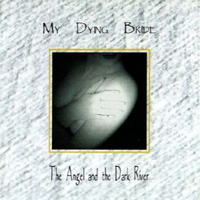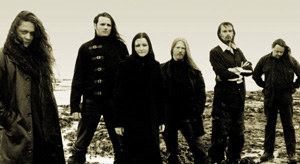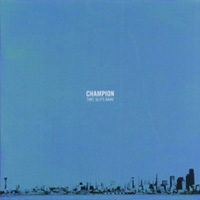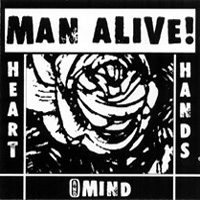 My Dying Bride
My Dying Bride
The Angel and the Dark River (Fierce)
An interview with guitarist Calvin Robertshaw
by Scott Hefflon
Flowing darkly, like ocean waves lapping against a gloomily picturesque shore, My Dying Bride returns not with an album, but with an epic. The six songs on The Angel and the Dark River rise and fall, building emotion to a crest before smashing against the rocks, withdrawing quietly to lick their wounds before the swelling begins again. The process takes anywhere from eight to fifteen minutes, and is divided into smaller crashes and undertow lullabies. Describing the dramatic and moving sound would cheapen the atmosphere and mood created and obliterated throughout the disc. Mentioning the weeping violins, haunting keyboards, desperate guitars, and painful laments, brimming with love and loss, would be to catalog the tools used, but would fail to render the craftsmanship meaningful – either separately or in unison. “Symphonies of sadness” is merely a clever phrase that alludes to the brooding emotional impact of the songs.
I believe Aaron writes most of his own lyrics. Is writing the music a combined effort?
Andrew, the other guitarist, and myself wrote most of the last album, The Angel and the Dark River. It was released in England last May, so there’s been quite a long wait for it to be released in America. We’re currently writing new material, so I refer to it as “the last album.”
You released Trinity not too long ago. A sort of anthology?
We usually record an album, then an EP, an album, then EP. We’d been encountering a lot of feedback from people around Europe saying they’d been having difficulty getting hold of the EPs, so they were all put together on one CD. It basically gave people an opportunity to hear how we’ve progressed though the three EPs, covering four years of changes. The production has changed, the songwriting has changed, Aaron has developed his vocals…
How was it, listening to the early material?
The early material was rough. I can’t say it’s embarrassing, but production-wise, we were very naïve when we first went into the studio. We tended to go with other people’s ideas rather than our own.
You hadn’t really established an identity, or a specific sound the way you have by now.
Not at all. Now we know exactly what we want from our sound, and with our engineer, we know exactly how to get it.
The single, “The Cry of Mankind,” was drastically edited from the original. Are your songs purposefully of epic length?
The original of that song is 13 minutes. We’re just not allowed to do full-length videos. Most of our songs vary from six and a half to the 13 minute length. We don’t initially set out to write long songs, that’s just the way they end up. We don’t set time limits on either end, they take as long as they need to.
What makes each song so long?
We like to build songs to various crescendos, and evoke as many emotions as we can within each song. We also have a lot of tempo changes within songs; there are very few songs that stay the same tempo the whole way through.
Which songs, in your opinion, really capture the building moods, the progression?
“From Darkest Skies” and “Two Winters Only,” which was the first time we’d ever used clean guitars on a album. That makes for immense emotional changes, especially when we perform it live.
You haven’t done a US tour, and I’m not in the habit of popping over to Europe to see a show, so tell me about your shows.
Everything we do on the albums, we perform live. We take the same engineer we work with in the studio on the road with us. He knows exactly what to do to recreate the song. We also have a lighting man, who we’ve worked with repeatedly. We use a lot of smoke. At one point, we put incense in the smoke machine. We use a lot of back lighting, too. Silhouettes always look nice, rather than bright lights in our faces all the time.
 Creating a mood is more than playing notes, is there a method to creating an atmosphere?
Creating a mood is more than playing notes, is there a method to creating an atmosphere?
We both write similar guitar lines, and neither of us are really guitar virtuosos. Whatever it is just pours into the melody, really. We don’t sit down and say, “We have to do a scale in F#, or F minor” because neither of us can read music in the first place. That would be rather futile. We just play what we want to hear.
Does the lyric writing get done first, then the music; or is it the other way around?
We used to read through Aaron’s lyrics first, then decide what the song required musically. For The Angel and the Dark River we wrote the songs first, then Aaron took a copy and put the lyrics to them. We can work either way. We used to have trouble writing music without having the whole idea first, but now we can build starting on either end.
Aaron is using his voice more as an instrument now. It’s not just what he’s saying, but the way he says it.
We were all astounded when we first heard his natural vocals. The first four releases were just straight, gruff, death metal vocals. When we rehearsed this record, we couldn’t really hear his voice because the rehearsal space was so small, and the P.A. was a bit cheap. When we finally got into the studio, we realized that he has a really good voice and that he can use it to such good effect. We were really surprised.
Do you see this as an evolution from death metal, or as a completely different style?
When we started out, death metal was the big thing. In 1990, everyone was getting signed and everyone had an album out. When we did our first demo, there was death metal on there, but there was an 11 minute version of “Symphonaire Infernus,” a slow doom song with heavy keyboards and gruff vocals. So we’ve been doing this kind of thing all the way back to the beginning.
Is it a geographical thing [shared with Anathema, Paradise Lost, etc.]? What’s Yorkshire like?
Yorkshire is a very old city, with a lot of beautiful buildings, a lot of inspiring architecture. I go down to the city center where all the shops are, and all people look at are the shop fronts. Yet if you look above them, some of the building are so highly decorative, it’s breathtaking. Entire stained glass roofs meeting at a pinnacle, not unlike a church. I write what I see.
What about other, more personal influences? I hear a cat in the background. Do you have a wife or girlfriend; what other elements affect you that translate into your music?
I’m engaged and I have a house with me girlfriend, so I’m more settled than I’ve ever been in me life. I don’t have the traumas of living at home anymore, I’m me own person, rather than thinking, “I’m 25 years old, when am I going to be able to afford to get out of the family home?” I’m settled in that respect, and that probably does affect me musical writing.
The video for “The Cry of Mankind” that got banned, was that made to be shocking, or has the whole thing been blown out of proportion?
I think it was blown out of proportion. We’ve never seen any articles anywhere on it, just word of mouth from the record company. It could just all be hype. In that case, it’s got nothing to do with us; we just shot the video, released it, and sent a copy to MTV and various other music stations.
Did you make the video to push limits, or was there a message you wanted to get across regardless of possible offense?
There was definitely a point to be made visually – that’s why you do a video in the first place. It was not meant to be put in the face of the public to make them think, it was meant to be more subtle. I know it’s quite a blatant video in its graphic content, but it’s not blasphemous. It’s not meant to be anti-religious.
Aaron dressed as Jesus Christ, dripping in blood, stalked by a psycho groupie in a wedding dress carrying a knife – what’s the message? Images like that are easier to dismiss than to interpret, and that’s exactly what MTV has done. Now the message is lost because most people will never get a chance to see it. What was the point?
The video is about the love and devotion people have for religion in abstract, but lack for their families and friends. They forget about the people around them, friends and strangers, that are suffering. They focus on the suffering of one man. Everyone suffers, everyone bleeds, not just Jesus Christ. Putting all of your faith and attention into religion actually causes suffering in those you ignore. Religion divides people in more and greater ways than it unifies them.
Politics and religion are essentially the same as sports, and I’m not a big sports fan. It seems the spokesmen (“persons of spoke” if you like) for “the new generation” are not politicians or saints, they are musicians. For better or worse, lyricists and interviewed musicians are supposed to be our guides.
I don’t listen to lyrics. I’m a guitarist, so I express myself through my guitar. When I listen to music, I think about what the music is saying, not what the lyrics are saying. Music can’t change my mind, but it can change my mood.



